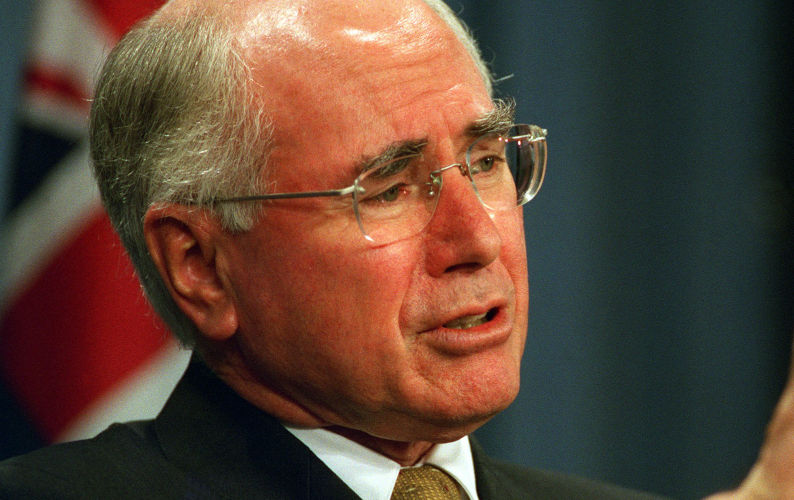John Howard and British colonisation of Australia
January 30, 2025
Humphrey McQueen (Pearls and Irritations, ‘The lucky Aborigines’ 26 January 2025), has reminded us of John Howard’s opinion that “the luckiest thing that happened to this country was being colonised by the British. Not that they were perfect by any means, but they were infinitely more successful and beneficent than other European colonisers.”
Really? Infinitely better? That sounds like an awfully great margin of superiority, and as far as I know Howard never provided any evidence to support his claim. Sure, the French and the Spanish did some terrible, even unspeakable, things in the New World, and no doubt the Portuguese, the Dutch and others did likewise. But the evidence of dreadful behaviour by white colonisers for several decades in Australia is overwhelming and it is growing rapidly – massacres of thousands of Aborigines, the taking of ancestral homelands for farming, the forcing of whole peoples onto missions to be trained for domestic service, the stealing of children . . . . The list goes on.
In the last two years, Pearls and Irritations has published accounts, written by the descendants of Australian settlers, of massacres. David Marr and Frances Letters were the authors of harrowing stories of the killing of Aborigines.
Howard has a sympathetic view of the record of British colonisation and a less benign one of other European nations’ expansions of their empires. Could his thoughts be those of somebody with a fond and rose-tinted view, untrammelled by evidence or objectivity, of the British people whence he came?
Sussan Ley, a federal opposition frontbencher, waded in last week with a claim that the settlers of early New South Wales did not ’intend’ to harm Aboriginal inhabitants. That is undoubtedly true of Governor Arthur Phillip, by all accounts a kindly man who came with instructions to engage the local people and treat them well. But Phillip could not control escaped convicts, fearful of an alien land and its people and desperate for food and women. Nor, later, could other governors control the settlers beyond the limits of civilised order, or indeed the newspapers that preached hate, violence and the legitimacy of white domination.
The Sydney Herald claimed in 1838 that there were “too many savages amongst us”. That was tantamount to encouraging genocide to rid the colony of New South Wales of its Aboriginal population. Axiomatically they were inferior, barely human and a bar to progress as defined by whites.
Howard and Ley both minimise the reality of the appalling treatment of Aborigines in the not-so-distant past. It is sometimes said that the settlers were Christians, as indeed many were, and that in taking Aboriginal children they had the interests of the children in mind. But there is not much evidence of the Golden Rule of Christianity (“Do unto others as you would have them do unto you”) in Aboriginal relations during Australia’s decades of the Stolen Generations. Massacres of groups of Aborigines continued well into the twentieth century, the taking of children from their parents by governments into the 1970s. These things resulted in alienation and demoralisation of Aboriginal people from the rest of Australian society. from which no good has come.
The children, it is said by some, were not being properly looked after by Aboriginal people and communities. Says who? Says white Australia! But what would white Australians think if their own children were taken away by people from an alien culture and raised according to that culture’s norms instead of by their own people with, as in the case of Aboriginal people, tens of thousands of years of child-raising behind them?
All this is well documented and seemingly beyond serious challenge. So why do conservative leaders have so much trouble acknowledging it? Colonisation is and has been, almost everywhere, a harsh and brutal process, despite Jacinta Nampijinpa Price’s view that in Australia it has had no lasting negative effects. It is surely naïve and serving unworthy notions, perhaps even racist ones, to believe that the British version of colonisation in this country was somehow fundamentally different from and vastly kinder than others. Howard concedes that it was imperfect, but that seems a pretty poor attempt at recognising the truth of the matter.
In any case, trying to rate colonial regimes by ‘quality’ is rather fruitless. They all left behind some benefits of European civilisation in terms of infrastructure and health interventions, but these were largely for the colonists and only later seeped through to native populations. And they were all barbarous at times in their interactions with the locals.
The conservatives won the debate on the Voice. They don’t have much truck with truth-telling, and the prospects for Treaty at this stage look poor. The three goals of the Uluru Statement from the Heart seem unlikely to be achieved in the foreseeable future. Australia’s sense of a ‘fair go’ is in some doubt.


